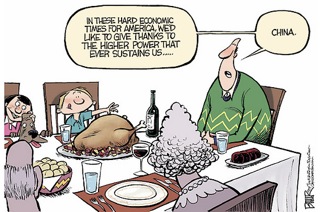Sino-American Power Play: Why China Has to Buy US Debt

Please note that we are not authorised to provide any investment advice. The content on this page is for information purposes only.
Last week, credit ratings agency Standard and Poor’s (S&P) downgraded U.S. debt from a stellar AAA rating by a notch to AA+. The move sent financial markets in panic mode as investors grappled and tried to comprehend the severity and extent of the United States’ ability to finance its bills.
Last week, credit ratings agency Standard and Poor’s (S&P) downgraded U.S. debt from a stellar AAA rating by a notch to AA+. The move sent financial markets in panic mode as investors grappled and tried to comprehend the severity and extent of the United States’ ability to finance its bills.
Similarly, China, who holds a massive amount of U.S. Treasuries, wasted no time in letting known their impatience and displeasure. China’s state-run agency, Xinhua, took Washington to task, criticizing its “addiction to debts” and inability to “live within its means”. Meanwhile, the People’s Daily lambasted the level of American public debt as “irresponsible” and “immoral”.
Clearly, the S&P downgrade hit a raw nerve with investors worldwide and the general Chinese populace. On China’s largest social media and micro-blogging platform, Weibo, many Chinese netizens raged on their keyboards, highlighting the vulnerability of their motherland. As one micro-blogger commented,
[quote] “The United States’ sovereign credit rating suffered a downgrade, why did we become the biggest victim?” [/quote]Yet, another blogger lamented,
[quote] “Chinese people are working hard, day in and day out, the economic environment is so good, but people’s livelihoods are not so great – turns out it is because the government is tightening people’s waist belt to lend money to the United States.” [/quote]Some observers have suggested that China could easily absolve and relieve itself from the United States’ debt woes and bring the United States to its knees by selling off its US$1.2 trillion of American securities and dollars. In 2010, when the United States signed an arms agreement deal with Taiwan, generals from the People’s Liberation Army publicly threatened to use China’s debt holdings as a weapon. China’s top central bankers, however, wisely declined and paid no heed to such suggestions.
China has invested nearly half of the country’s US$3.2 trillion worth of foreign currency reserves in U.S. Treasuries, and no other country comes close to this figure. Japan, the next largest buyer of U.S. Treasuries, holds US$912 billion.
Whether China’s bears, zealots and patriots realize it or not, China has few options other than to continue its open market operations in order to keep its currency weak and protect its export-driven regime.
As Patrick Chovanec, professor at Tsinghua University’s School of Economics and Management and leading commentator on Sino-American relations, described in a recent National Public Radio interview, China may be unhappy with the U.S. debt mismanagement, but “unless it dramatically changes its approach to its own economy, it is pretty much along for the ride.”
The heart of the issue here lies in China’s market fundamentals. For a large part in the past three decades, China’s economy has ran huge trade surpluses while keeping its currency, the renminbi, severely underpriced. Central government policy goals at promoting inward investments and capital accumulation have therefore been largely successful and these economic strategies have been the key proponents behind China’s outstanding growth and economic progress.
However, restrictions on currency flows have seen China’s stock of foreign currency reserves pile up as China continues to support its artificial price-competitive advantage.
According to Joseph S. Nye Jr., professor at Harvard’s John F. Kennedy School, the Chinese threat to dump U.S. bonds is merely an empty threat.
[quote] “In doing so, China would not only reduce the value of its reserves as the price of the dollar fell, but it would also jeopardize U.S. unwillingness to import cheap Chinese goods, which would mean job loss and instability in China,” Nye Jr. said. [/quote]With the twin effects of the United States being China’s main trading partner and the U.S. dollar being the main trading currency, China finds itself in a paradox where it has to continue buying U.S. debt in order to keep the imbalances to its advantage.
Ideally, China could release part of its U.S. dollar reserves in exchange for other currencies, imports or invest abroad, albeit at a loss as the U.S. dollar continues to weaken. But, as Chovanec explains,
[quote] “Even if it could to that, there just are not any markets that are as large or liquid as the market for U.S. Treasuries, to accommodate the amounts of money we are talking about.” [/quote]Related: China is Sick of US Hollow Promises and Reckless Government: Stephen S. Roach
Many economists have long highlighted the fact that China’s current growth model is unsustainable. As long as China continues to protect its export industries, it would see the need to undervalue the renminbi, albeit at the expense of Chinese consumers and local businesses.
As such, until China decides to reform its market fundamentals and move away from being an export-dependent economy, it will continue to find itself in a constant power play with the debt-ridden United States.




